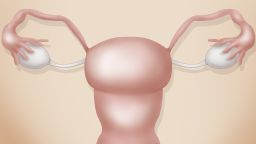Sign up for CNN’s Stress, But Less newsletter. Our six-part mindfulness guide will inform and inspire you to reduce stress while learning how to harness it.
Being pregnant is tough enough, but with the added pressure of work, a shaky economy and the risks of Covid-19, it can seem overwhelming. But if it’s possible, expectant mothers should try to take stock of their stress and reach out for help to reduce how often their newborn is likely to experience negative emotions, according to a new study.
The study, published Wednesday in the journal Infancy, found babies of moms who experienced more fluctuations in stress during pregnancy showed more fear, sadness and distress at 3 months than those of moms who were less stressed.
Women with higher fluctuations were more likely to report that their babies often seemed angry, crying or fussing when left in a crib; showed distress when they were tired; and clung to a parent when introduced to an unfamiliar adult, the study said.
“We know that infants experiencing chronic stimulation of the stress response system (chronically elevated cortisol), or ‘toxic stress,’ without the buffer of a caring adult have impact on early brain development, immune system and epigenetics,” said Dr. Marian Earls, chair of the American Academy of Pediatrics Council on Healthy Mental & Emotional Development, in an email. She was not involved in the study.
Research on infants of mothers with postpartum depression sheds light on other potential impacts as well. For example, children of depressed mothers are more likely to have higher levels of the stress hormone cortisol as preschoolers, “and these changes in levels are linked with anxiety, social wariness, and withdrawal,” according to the AAP’s policy statement on depression after birth.
These children may have “poor self-control, poor peer relationships, school problems, and aggression,” as well as attachment disorders, behavior problems, and depression and other mood disorders, the statement said.
However, a 2019 study found that if a child has a caring adult that can provide a safe and stable nurturing relationship, many childhood adversities can be modified.
Gathering stress data in real time
Researchers had 72 women complete surveys about their stress levels up to four times a day over a 14-week period during pregnancy. When their babies turned 3 months old, mothers filled out the Infant Behavior Questionnaire, a survey that measures infant temperament.
Measuring the highs and lows of stress in real time during pregnancy allowed scientists to see a more comprehensive picture of the women’s levels of tension.
High fluctuations could mean that “individuals have more instability in their current life circumstances, or that those individuals might have a tendency to perceive their circumstances to be less stable or they have more difficulty regulating their emotions,” said lead study author Leigha MacNeill, research assistant professor of medical social sciences at Northwestern University’s Feinberg School of Medicine in Chicago.
These frequent changes may have important implications for children’s emotional development, MacNeill said.
The next step in the study team’s research is to look at how a mother’s biology changes as her stress fluctuates, so researchers can learn more about how it affects the baby, she said.
Additionally, it’s normal to experience some stress during pregnancy, so more data is needed to determine what types and levels of stress impact the mother and her baby, MacNeil said.
The pandemic did not affect stress patterns
While the researchers did not intend to conduct this study during a pandemic, it was a happy accident because it allowed them to examine if stress levels were different in pregnant women before and during Covid-19.
“We found that participants reported similar levels of stress patterns regardless of whether their stress measurements were taken before or during the pandemic,” MacNeill said.
The study is limited, however, because most of the women were middle-to-upper class, partnered and well educated, which could have shielded them from much of the stress families felt during the pandemic, the authors say.
How you can reduce stress before and after pregnancy
It’s natural to feel stressed during pregnancy, but there are strategies to keep it from negatively affecting women and their babies.
Expectant moms can try deep breathing exercises to reduce stress and lower their heart rate. One technique is called abdominal breathing, which is where you inhale through your nose for five seconds, then exhale through your nose for another five seconds.
Exercising for at least 150 minutes per week may lessen the risk of developing depression and reduce anxiety and stress during pregnancy, according to a 2019 report published in the journal Medicina.
An activity like yoga can strengthen the muscles used during childbirth and lessen the severity of medical conditions like nausea and back pain, according to the Mayo Clinic. Yoga is also a calming form of physical activity, which can improve your mental health by releasing endorphins, or feel-good hormones.
Women should speak with their gynecologist to ensure physical activity is safe during pregnancy, Mayo Clinic said.
Engaging in stress-reducing activities postpartum can also be beneficial for both moms and their babies. Research has shown that allowing new mothers more opportunities to “bond with, breastfeed, and simply stroke their children,” can help babies reduce “their stress responses more effectively,” the AAP noted in a policy statement on preventing toxic stress in childhood.
Positive, as well as negative, life events can mold a child’s future, the AAP stated, adding that studies have shown that positive experiences like book reading with “engaged, responsive caregivers,” age-appropriate play with other children, and quality day care and preschool education “are associated with positive impacts on learning, behavior, and health.”




